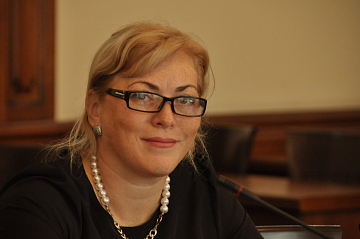AltSU implements more than 400 additional education programs. Choose yours!
 Altai State University in the last few years has become one of the leaders in the Siberian market of additional education. And with the development of remote digital technologies, it became possible to enroll in AltSU courses and gain knowledge anywhere in our country. Ksenia Ikonnikova, Vice-Rector for Educational Work and Additional Education of Altai State University, tells about why a modern person needs to improve his or her qualifications and how this can be done with the help of a classical university.
Altai State University in the last few years has become one of the leaders in the Siberian market of additional education. And with the development of remote digital technologies, it became possible to enroll in AltSU courses and gain knowledge anywhere in our country. Ksenia Ikonnikova, Vice-Rector for Educational Work and Additional Education of Altai State University, tells about why a modern person needs to improve his or her qualifications and how this can be done with the help of a classical university.— Ksenia Vladimirovna, let's start with the simplest question: what is additional education in the modern sense? Why is it becoming more and more popular?
— The life of a modern person is often characterized by very rapid, sometimes unexpected changes in personal careers and professional activities. In order to maintain our competitiveness and demand in the labor market, we have to constantly engage in self-education. Because the goal of the educational process for each person is self-realization and development.
Additional education in modern realities is a completely natural reaction of a person to changes. People come for knowledge in order to quickly adapt to market requirements, they seek to expand their competencies and increase their value as specialists.
From the point of view of an entrepreneur or business owner, additional education is an opportunity to improve the capabilities of their own company in a short period of time by obtaining new qualifications for employees. For example, to introduce a new technology or launch an important project. One of the objectives of the additional professional education is precisely to develop and promote programs that allow enterprises to increase their efficiency by obtaining the necessary competencies for employees.
— Today, there are so many different training courses advertised on the Internet and social networks that applicants can get lost. Why is it necessary to receive additional education at the classical university?
Let me give you a few key arguments. Firstly, AltSU became the only participant in the federal program "Priority 2030" in the region. To do this, the university has passed a serious competitive selection and confirmed its high status. It is no coincidence that “Priority 2030” is called the strategic academic leadership program. One of the key guidelines for its implementation is the active involvement of residents of our region in the field of additional education.
Thus, by implementing a set of educational programs for further vocational education, our University ensures sustainable socio-economic development of the region, participates in the improvement of the labor resources of Altai Krai. At the same time, AltSU has possibilities to help a person make a meaningful choice of an educational trajectory. We can help a person in a difficult situation answer the questions – “Why will I study? What real opportunities will I have after training? What qualities should an employee of a particular profession possess?”
Another important argument is that a classical university education is more prestigious and inspires confidence than a commercial one.
— How is additional professional education organized at AltSU?
As you can see, our programs cover almost all the most important industries in the region. A complete list of programs can be found on our Continuing Education Portal. Training under the programs takes place both in person at the university and with the use of distance technologies, when the student, staying at his workplace and in his locality, can be trained at the University.
— Who can receive additional education? What categories of citizens?
– Additional training can be completed by persons who have or are receiving secondary or higher professional education. The cost varies depending on the duration and type of program: from 1,500 rubles to 50,000 rubles. But the state takes into account changes in the labor market and it is no coincidence that for a number of categories of citizens it has established the possibility of studying with state support - according to the national project "Demography" you can study for free.
— Is this opportunity set for everyone?
— No, not for everyone, but for a very wide categories of citizens (see reference). We consider it necessary to convey this information to all residents of the region. Indeed, often they simply do not realize that such an opportunity is provided to them by the state.
— What educational programs are in demand today? Could you give some examples?
— A wide range of programs has been in demand. For example, over the past six months, programs such as accounting, social work in the system of social services, psychologist in the social sphere, theory and methods of teaching a school subject, digital promotion of educational products, subject teacher, theory and methods of teaching a subject, nutritiology and others.
— How to sign up for the training?
– Information about programs, organization of training, registration for training can be obtained directly from the Office of Additional Professional Education:
Barnaul, Lenin Ave., 61, office 805, phone: +7 923 568-00-49, (83852) 29-81-20. Our website - dpo.asu.ru